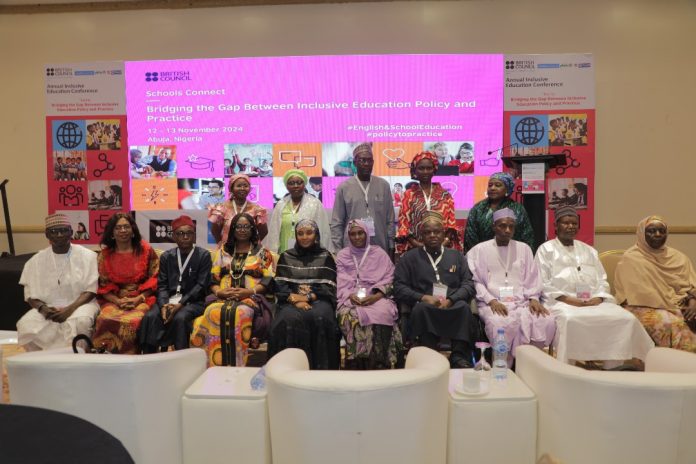Abuja, Nigeria – November 12, 2024
In a powerful show of support for inclusive education in Nigeria, Chief Ayuba Gufwan, Executive Secretary of the National Commission for Persons With Disabilities (NCPWD), declared the Federal Government’s dedication to building an educational system that embraces all students, regardless of ability. Speaking at the Annual Inclusive Education Conference hosted by the British Council and the Partnership for Learning All in Nigeria (PLANE), Gufwan emphasized the need for policy to translate into genuine, widespread practice in classrooms across the nation.
Held in Abuja, the conference, titled “Bridging the Gap Between Inclusive Education Policy and Practice,” brought together key stakeholders, educators, advocates, and government officials to address the strides made and challenges remaining in inclusive education. Chief Gufwan’s remarks echoed the conference’s theme, underscoring that inclusive education is a national imperative that must reach beyond theoretical frameworks and take root in Nigerian schools.
Gufwan praised the British Council and PLANE for their unwavering support of inclusive education in Nigeria, highlighting the Commission’s own dedication to collaborating with all partners in pursuit of an inclusive future. “It is essential that we bridge the gap between policy and practice,” Gufwan stated. “For inclusive education to succeed, it must be adopted and embraced within our classrooms, benefiting students in every corner of Nigeria.”
The Executive Secretary presented a robust action plan that calls for a comprehensive, multi-faceted approach to inclusion. Gufwan emphasized that inclusive education should be a shared responsibility across sectors, encouraging all stakeholders to contribute actively to its implementation. In a visionary proposal, he advocated for sign language to be recognized as an official language in Nigeria, which would support the Deaf community and foster improved communication and inclusivity in schools and beyond.
A key point in his presentation was the necessity of gathering accurate, disaggregated data to understand and address the specific needs of persons with disabilities across the country. Gufwan urged stakeholders to collaborate on collecting this vital information, which would strengthen planning and resource allocation. “Data is the foundation of meaningful change,” he explained. “When we have a clear picture of the needs within our communities, we can create solutions that truly make a difference.”
The government’s commitment to inclusive education was further underscored by the presence of Honorable Tunji Alausa, Minister of Education, who was represented by Dr. Suwaiba Ahmad, the Minister of State for Education. In her address, Dr. Ahmad affirmed President Bola Ahmed Tinubu’s administration’s pledge to eradicate discrimination in schools, ensuring equal opportunities for all students. She formally launched the National Policy on Inclusive Education, a critical step forward, and inaugurated the Committee on Inclusive Education, which will be instrumental in driving the policy’s implementation.
“This administration is fully committed to an educational system where no child is left behind,” said Dr. Ahmad. “We recognize the challenges, but we are equally determined to address them. With the right policies, dedicated teachers, and community support, we are building a brighter future for all our children.”
Adding to the discourse, Esther Bature from Sightsavers shared insights from recent research into inclusive education in Nigeria, particularly in the North West region. Bature highlighted the importance of equipping teachers with the skills and resources necessary to support students with disabilities, noting that properly trained educators are crucial to closing the gaps in the current educational system. She announced plans to expand teacher training programs, aiming to foster a more inclusive classroom environment across the country.
As discussions continued, the collective enthusiasm for inclusive education was evident, with attendees expressing hope and resolve to drive real, sustainable change. With the introduction of the Committee on Inclusive Education and ongoing support from the government, advocates, and international partners, Nigeria is taking concrete steps to make inclusivity a reality for all students.
The conference concluded on a note of optimism, with stakeholders and participants committed to maintaining momentum and ensuring that the vision of inclusive education becomes a lasting legacy in Nigeria. For advocates and educators alike, the progress made represents not just policy shifts but a transformation in values—one that honors the potential of every Nigerian child.
Reported by Mbanefo JohnMichaels Ikechukwu, Head of Information and Public Relations, NCPWD


